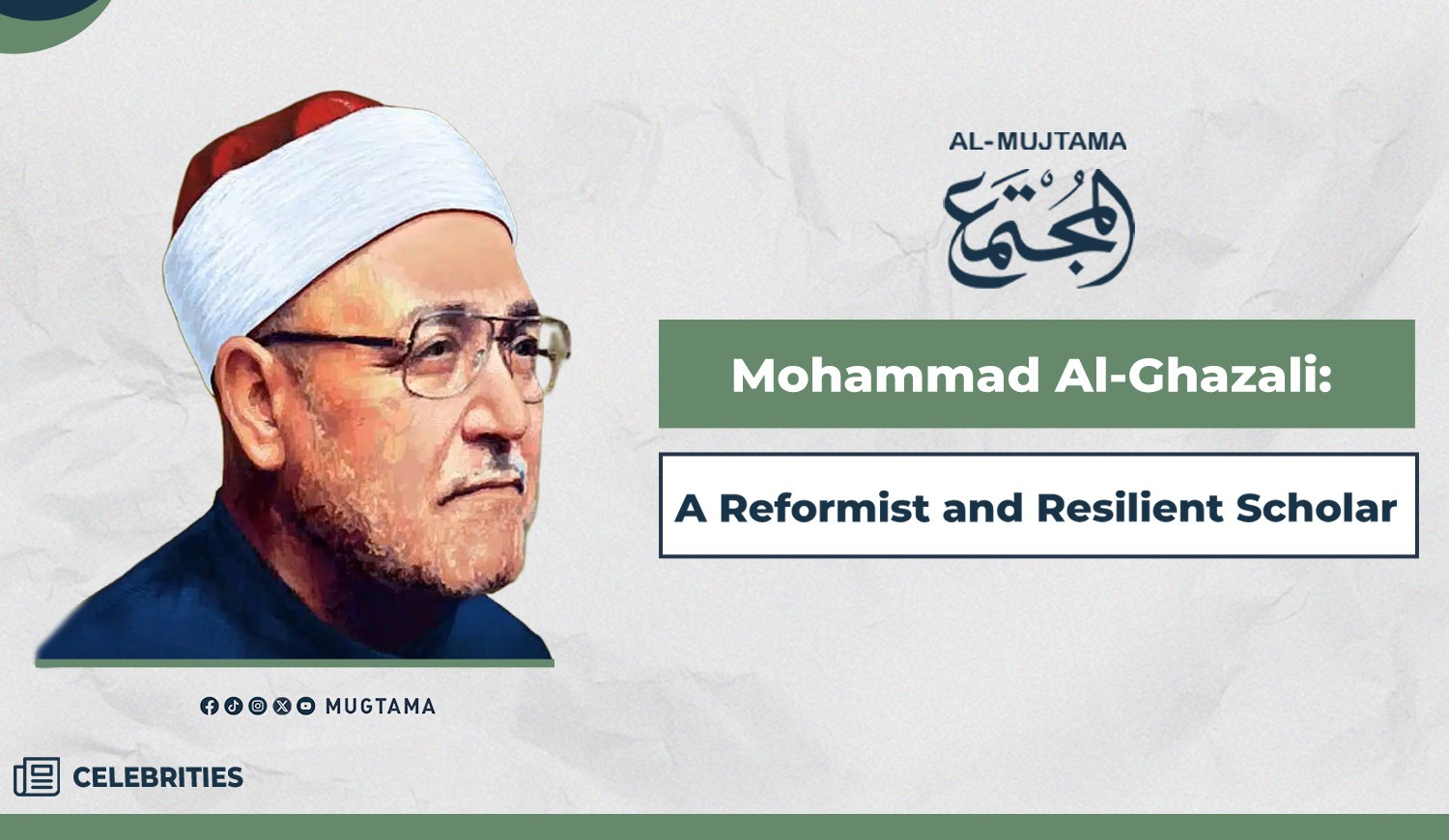Mohammad Al-Ghazali: A Reformist and Resilient Scholar

Mohammad Al-Ghazali, a prominent Islamic thinker and a distinguished da'ee
(preacher) known for his intellectual and scholarly contributions, is
considered a modern reformist scholar. He was a prolific writer, authoring
numerous seminal books on contemporary Islamic thought. He was arrested during
the reigns of King Farouk and the late President Gamal Abdel Nasser and passed
away in 1996.
Birth and Upbringing
Mohammad Al-Ghazali Al-Saqqa Al-Jubaili was born on September 22, 1917, in the
village of Nekla Al-Anab, Mit Ghamr, in the Beheira Governorate of Egypt.
Education and Formation
Al-Ghazali memorized the Holy Quran at
an early age, with his father ensuring his diligent recitation. He then pursued
religious sciences at Al-Azhar, earning a higher certificate from the College
of Usul Al-Din (Principles of Religion) and a Master's degree in Da'wa and
Guidance in 1360 AH. He maintained good relations with Sheikh Abdel Azim
Al-Zarqani, Ibrahim Al-Gharbawi, Abdel Aziz Bilal, and others. He was also
influenced by and pledged allegiance to Sheikh Hassan Al-Banna, the founder of the Muslim Brotherhood.
Roles and Responsibilities
Al-Ghazali held several religious
positions, including Director of Mosques, Director-General of Islamic Da'wa in
1391 AH (1971), and Undersecretary of the Ministry of Endowments for Da'wa
Affairs in 1400 AH (1980). He also taught at Al-Azhar.
Political and Academic Experience
Al-Ghazali joined the Muslim Brotherhood early on and pledged allegiance to Hassan Al-Banna. He was also an opponent of Gamal Abdel Nasser.
Al-Ghazali had a dispute with the
leadership of the Muslim Brotherhood due to "confused information he received about the
guide Hassan Al-Hudaibi," which led to his expulsion. However, this did
not stop him from standing by them after the campaigns of arrest, imprisonment,
and torture they were subjected to under Nasser's rule. He also refused on more
than one occasion to participate in attacking them through the media, which led
to his own imprisonment. Al-Ghazali later apologized for some of the
accusations he had made against Al-Hudaibi.
Sheikh Al-Ghazali was known for his
confrontation with tyranny
and its intellectual origins and the jurisprudential interpretations that
sought to legitimize oppression and coercive rule. His book, Islam and Political Tyranny, is considered a landmark in this area, making
his name "detested by the ruling authority."
Al-Ghazali recounted about this book:
"My most famous book, in which I attacked tyranny and corrupt rule, was
called Islam and Political Tyranny. This was in the late 1940s, and this day was
one of the most important days of my life; I consider it a turning point for
me... As soon as the book was released, I was surprised to see the entire
government shaken and issue a decision to confiscate the book. I felt that the
royal palace was severely shaken by this book, and I was arrested and brought
to trial on charges of attacking the government. I got out of this case without
anything being proven against me."
Al-Ghazali saw tyranny as an enemy of
progress and civilization, and he used to repeat, "There is no freedom
where there is political tyranny, no religion where there is political tyranny,
no civilization where there is political tyranny." He would say that
"tyrannical rule is a demolition of religion and a destruction of the
world; it is a calamity that afflicts both faith and civilization. It is a
foreboding smoke under which souls and bodies suffocate wherever it extends.
Neither the market of virtues and manners flourishes, nor does the market of
agriculture and industry thrive."
Al-Ghazali criticized the Personal
Status Law, famously known as the Gihan Law (the wife of the late President
Anwar Sadat), which led to him being silenced and his books confiscated. When
he had the opportunity to immigrate, he went to Saudi Arabia, where he
worked as a professor of Da'wa at the College of Sharia at Umm Al-Qura
University in Mecca in 1397 AH (1977). He also contributed to the founding of
Imam Abdel Kader Islamic University in Constantine, Algeria, in 1980, and held
several university positions in Egypt.
Al-Ghazali warned against the
demolition of Al-Aqsa Mosque, stating that its loss was not just a Palestinian issue but a
Quranic one, and that the Jews were acting based on a religious belief, while
Muslims were not acting with the required religious conviction. He said it was
the duty of Muslims to make the battle a battle of faith.
He also spoke about Christian
missionary work, saying that the missionary invasion had no respectable
scholarly sources, and that missionaries avoid direct confrontations because
they know the danger they pose. It is the duty of Muslims to be aware of the
missionaries' tricks and ploys by strengthening the relationship between the
Muslim and their faith, so they do not deviate behind false calls.
He wrote Islamic articles that
addressed issues of thought, culture, women, and social and economic problems
in the light of Islam.
He defended women, refuting the claims
of Islam's opponents by saying: "Is Islam to be blamed if it based its
system on not requiring a woman to earn a living, and made the husband or
father responsible for his wife or daughter? Is Islam to be blamed if it knew
that a woman would lose her honor for a piece of bread, so it established its
system on the basis of providing for her and preserving her honor? Then he
asked: Are nudity, dancing, promiscuity, and the arousal of dormant
instincts... are these elevated rights that women have gained? Did they support
their side in society with them, or are these animalistic urges imposed by
wicked men to degrade women and make them subject to their desires?"
He believed that moderation and
balance were necessary regarding the issue of unveiling and the hijab,
advocating for a legitimate hijab that allows women to contribute to religious
and social progress.
He called for reopening the door of ijtihad
(independent reasoning) and said, "Closing the door of ijtihad is itself
an act of ijtihad, and this act of ijtihad to close the door of ijtihad has led
to harm. The harm is that the Ummah has effectively stopped at the old way of
thinking that was prevalent in the fourth century, approximately, and time
renews itself. As it was said: New matters arise for people as they create new
urges... so the door of ijtihad
must be left open."
He described the state of Muslims by
saying: Muslims now suffer from a religiosity of form, not of substance. When
religion turns into rituals and ceremonies, it loses its value... because
religion, above all, is a living heart, an alert conscience, and a clean inner
self.
Al-Ghazali called for the unity of
Muslims, considering the dispute between Sunnis and Shiites a great evil that
the entire Ummah has suffered from. He rejected the idea of there being a Sunni
Islam and a Shiite Islam.
He said, "Superstitions and
fallacies sweep over the masses of both Sunnis and Shiites, and a deep
backwardness holds them all back from the rights of God and the right to life.
Ignorance and emptiness shake the foundations of belief, and under their
shadow, trivial and frivolous generations emerge. Should we let the fire
consume our home and preoccupy ourselves with blaming and lying?" He
praised King Nader Shah, who tried to convene a religious assembly that
included Sunni and Shiite jurists.
Works
Al-Ghazali authored dozens of books,
including: The Muslim's Character, A Religious Struggle, Reflections
on the Quran, Our Intellectual Heritage, and Concerns of a
Preacher.
He also published: The Muslim's
Creed, The Harvest of Arrogance, From the Inspiration of the
Seerah, The Battle of the Quran in the Islamic World, The
Constitution of Cultural Unity Among Muslims, and The Prophetic Sunnah
Between the People of Jurisprudence and the People of Hadith, which sparked
a debate in Islamic magazines.
Among the important books he authored
are: Missiles of Truth, Islam and Economic Conditions, Islam
and Socialist Methods, Reflections on Religion and Life, Islam in
the Face of the Red Tide, The Reality of the Islamic World, The
Procession of Da'wa, Cultural Invasion Extends into Our Emptiness,
and How Do We Deal with the Quran?, a discussion he had with Omar Obaid
Hasana, the director of the Qatari magazine Al-Umma.
His sermons were collected in a book
titled The Sermons of Sheikh Mohammad Al-Ghazali on Matters of Religion and
Life.
Death
Mohammad Al-Ghazali passed away in
Riyadh on March 9, 1996, while participating in a symposium on Islam and the
West. He was buried in Medina according to his will.
On the day of his death, the Emirati
magazine Manar Al-Islam described him as a man who was proud of his
religion, himself, and his ideas. He was courageous in defending the truth,
firm in his defense, and noble in his dealings with people. He dedicated his
entire life and time to serving the Da'wa, calling to God with wisdom and good
counsel. He was patient and characterized by noble morals and high human
decency. He respected himself without arrogance and welcomed purposeful
dialogue and objective criticism. He was one of the preachers who had a firm
footing, successful steps, penetrating insight, and an enlightened, radiant
mind. He served the Islamic Da'wa, refuted the slanders and misconceptions of
orientalists against Islam, and stood against atheism and fanaticism.
Biographies about him were written by
Dr. Yusuf Al-Qaradawi, Sheikh Al-Ghazali as I Knew Him; Hassan Fathi
Al-Malakawi, The Intellectual Contribution of Sheikh Mohammad Al-Ghazali;
and Masoud Fellousi, Sheikh Mohammad Al-Ghazali and the Thematic
Interpretation Method in the Modern Era.
Source: Al Jazeera











